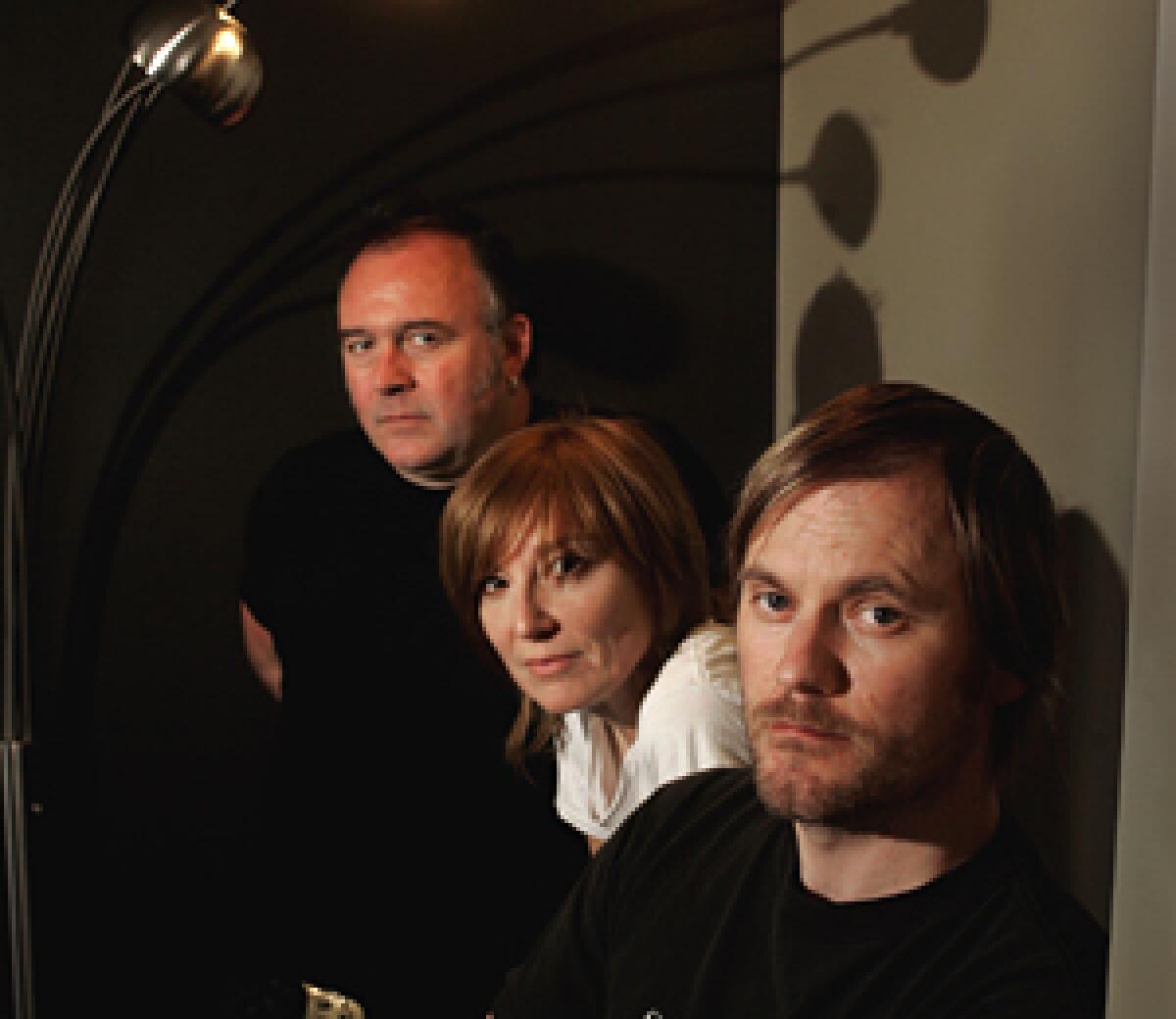Portishead is reunited and ready to play in the desert

MANCHESTER, England -- As Portishead takes the carefully backlighted stage at the ancient, tatty Manchester Apollo, heavy shadows fall across the band’s members. The concert spotlight has never come easy to vocalist Beth Gibbons or DJ-percussionist Geoff Barrow, though guitarist Adrian Utley is more comfortable in the live arena. Still, the English champions of blue modernism and bleak elegance might be the least natural “rock stars” since Pink Floyd, whose cravings for precise execution and anonymity they share.
Even after all his years on the scene, Utley remarks, “I still find it weird that I’ve got someone tuning my guitars for me and handing them to me onstage -- like servants.”
It’s that aversion to live performance that makes the band’s appearance Saturday at the Coachella Valley Music and Arts Festival all the more remarkable. It’s their only American gig on a “world tour” that began just four weeks ago in support of the band’s first new album in a decade, “Third,” due for release Tuesday.
While traveling via train from the band’s hometown, Bristol, to the show in Manchester, Barrow confesses, “I don’t enjoy it. I’m just playing to re-create the records -- trying to get it right is so stressful I don’t interact with the audience like you’re supposed to. Then I feel guilty about it.”
A not-unfriendly Gibbons sits across the aisle, chatting with tour bassist Jim Barr -- she won’t discuss her distaste for live performance, though. She never speaks to the press.
Good and sour times
Portishead launched its grave, soulful slow dance with success in 1994 with “Dummy,” an album filled with insinuated bleak hook lines like “Nobody loves me, it’s true” (“Sour Times”) and “Give me a reason to be” (“Glory Box”). The follow-up, “Portishead” -- it’s the town near Bristol where Barrow spent his teens -- did almost as well; 1998’s “PNYC,” recorded at New York’s Roseland Theatre, inadvertently marked the beginning of their great hiatus.
Knocked sideways by the music industry promotional whirl, Gibbons fell ill, while Utley and Barrow struggled through divorces. “I was broken,” Barrow recalls. “I went away to Australia for three years; couldn’t write songs at all.”
It took time, but Gibbons, who recorded a haunting album called “Out of Season” with her friend Rustin Man, and Utley, who sessioned with Goldfrapp, Sparklehorse and Gibbons, both recovered. When they joined Barrow in Australia to start again as Portishead in 2001, he still couldn’t handle it: “I didn’t have it in my stomach. No fire or fight. I was on autopilot.”
Finally, after he returned to Bristol to open a record label, Invada, with a friend, he found his much-needed source of inspiration -- the excitedly committed young artists they signed gave him “a shot in the arm”: “So uncompromising, loud, rude and offensive. I thought, now I can get working.” Even so, Gibbons, Utley and Barrow had to lay new foundations. Utley says: “We’d often spend hours talking about Iraq, the destruction of our National Health Service, architecture . . . biscuits! Anything. Trivial to massive.”
“And the talk drove us into writing,” Barrow adds. “We felt properly together as a band. For me, it’s partly because I’m 36 now, and the age gaps between me and Ade [50] and me and Beth [43] don’t matter so much anymore.”
Still they progressed circuitously. Utley and Barrow, sometimes damagingly self-critical, they agree, wrote tracks and threw them away. Often, when they presented Gibbons with material for her to add vocal melody and lyrics, she rejected it. “She has a visceral reaction to music,” says Utley. “Give her something crazy -- absolute noise -- and she’ll say it’s not crazy enough, which slows us down again. But we trust each other enough so that we can disrupt each other. Argue. Squabble your way through.”
“Portishead can be a frustrating place to live,” Barrow notes.
Slow to inspiration
Early in 2006, the band took seven tracks to their label, Island, and predicted the album’s completion within months. However, assailed by fresh doubts, they returned in 2007 with only six tracks -- they’d done nothing new that pleased them in the intervening year and actually opted to discard one song that previously had made the cut. They can laugh about it now because, as Barrow says, they “got on to a good one,” propelled by practical motivations -- namely, they were running out of money, and Utley and Barrow each had a new baby to support.
Also, the “warm glow” of fatherhood made each of them less critical about their music.
Not that Portishead’s trademark cold precision is missing from the new album. It’s clangorous with mayhem and melancholy, crash drums clashing with Gibbons’ vulnerable murmur, “Wounded and afraid inside my head.” It satisfies Utley because it’s “harsh, disjointed” and has “that pull of juxtaposition,” while Barrow suggests, “This is the album where I feel we’ve really succeeded in capturing our thoughts.”
“Third,” though, will be the band’s final major-label effort. Any future recordings will most likely be issued independently, but the prospect of scaling down causes Barrow no apprehension, given his experience with his own label, Invada. It was designed to survive at a micro-level and has released 25 albums carefully budgeted to break even selling just 300 copies apiece.
Indeed, these days, when he’s not performing in any case, Barrow seems more at ease with his place in the world. He’s come to terms with the frustrations of a childhood spent in a throwback village, Walton-in-Gordano, where his working-class background and undiagnosed dyslexia sometimes made him feel like an outsider.
“I’ve never felt I had that middle-class confidence in communication, except through music,” he says. “Making music, I know where I am, I know I’ve got a strength . . .”
That might be the key to his enduring artistic bond with Gibbons. “Just the other day, she told me she first started singing so that she could communicate better -- but it’s kind of done the opposite! She puts her feelings out there, but she never gets the answers she wants,” Barrow says.
“I think that’s why she doesn’t want to be interviewed by anybody,” Utley says. “The voice and the words are her. Listen to that, and, if it speaks to you, I think that’s all you need to know.”
More to Read
The biggest entertainment stories
Get our big stories about Hollywood, film, television, music, arts, culture and more right in your inbox as soon as they publish.
You may occasionally receive promotional content from the Los Angeles Times.










